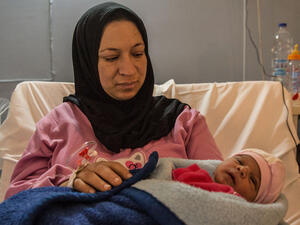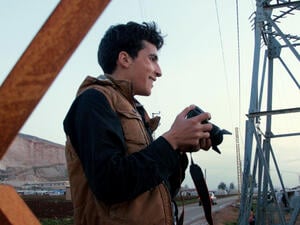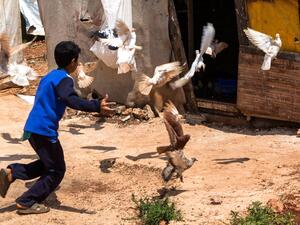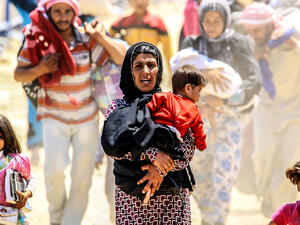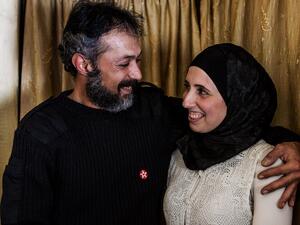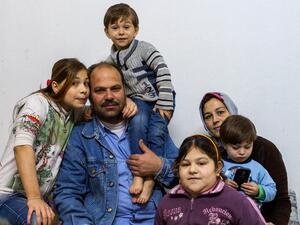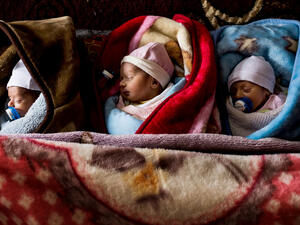UNHCR distributes relief items for displaced in Lebanon's mountain regions
UNHCR distributes relief items for displaced in Lebanon's mountain regions
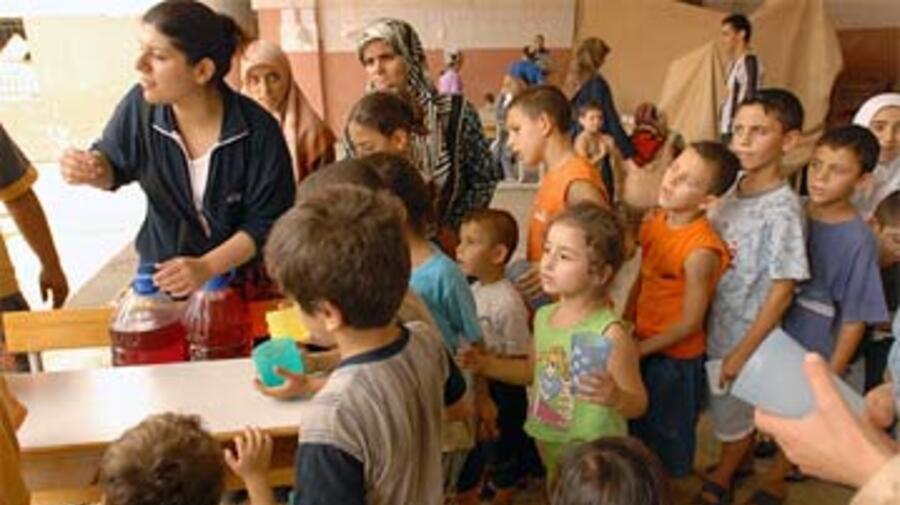
Chiildren queue up for refreshment at a school in Beirut housing the displaced. UNHCR has started helping people in mountainous areas north of the Lebanese capital.
BEIRUT, Lebanon, July 27 (UNHCR) - UNHCR field teams in mountain areas outside Beirut are buying and distributing supplies of urgently needed items for displaced people while waiting for tonnes of relief goods to be delivered from Syria. Meanwhile, individuals, businesses and local organisations in the Lebanese capital are approaching the refugee agency with offers of financial help and other assistance.
"Since the start of the crisis, our staff have been up in the mountains mapping out the displaced and their priorities, as well as buying supplies. Mattresses, blankets, kitchen sets and supplementary food items such as tinned goods, coffee and jam, as well as milk and diapers are being delivered to schools where thousands of people are living in very cramped circumstances," said UNHCR's Arafat Jamal in the Lebanese capital.
Jamal said buying and distribution of these items would continue over the next few days while the UNHCR team awaits the despatch of more than 500 tonnes of emergency relief supplies by convoy from Syria to Lebanon. So far, more than 1,000 mattresses and 1,000 blankets have been purchased in Lebanon and are being distributed.
"It's important for our relief convoys to get through from Syria as soon as possible. But, we can't forget this is an insecure and hazardous place to operate, in which it is very difficult to guarantee the safety of anyone involved in the relief effort. Many local trucking companies are keeping their trucks off the roads because of the risk," Jamal added.
UNHCR will also be sending bales of much needed clothing and blankets to the beleaguered southern coastal city of Sidon tomorrow, as part of a joint UN relief convoy.
An estimated 700,000 people have been displaced within Lebanon by the two-week-old conflict. More than half a million have fled to mountain areas, with about one third sheltering in schools and public buildings and the rest finding temporary homes with host families.
In the mountains north of Beirut, UNHCR and local authorities estimate there are 67,000 people living in 222 public buildings - 43,000 in the Aley valley, 2,500 in Baabda and the rest in Shouf.
The pressure on facilities and the local population is increasing daily. "In the overcrowded shelters, sanitation is a real problem and needs to be fixed quickly. In one school in the Aley valley - housing 400 people - there's only one bathroom for women. This makes it really tough for people who are already traumatised, anxious and angry," said Jamal.
The displaced are worried about their future and about how long the generosity of the local population will last. With the school year starting again in about a month's time, finding alternative accommodation for the displaced will be important.
Apart from the mountain regions, UNHCR staff have also been determining the priority needs of the displaced in other locations in the north and south of Lebanon. In Sidon, 23,000 displaced people were reported as living in schools, with a further 35,000 finding temporary refuge in private homes. Many are being helped by national non-governmental organisations, with local kitchens and restaurants providing food and water.
But there is a great need for mattresses, undergarments and hygiene supplies for women and children. In the northern city of Tripoli, some 2,000 displaced people are spread out over 30 school locations where they are receiving daily meals from local sources. Blankets and mattresses are needed for new arrivals, and sanitation arrangements in schools require immediate upgrading to cope with the numbers of people.
In Beirut on Thursday, UNHCR was approached by individuals, businesses, foundations and organisations who wanted to support the refugee agency in helping the displaced people. "This was unexpected, spontaneous and moving, and we are working to channel these donations to the most needy areas, and to build up valuable partnerships with these generous and important donors," said Jamal.
UNHCR's emergency team in Lebanon is being strengthened with the expected arrival in Beirut on Thursday of five further members coming by convoy from Syria. They will join four others already in Beirut to reinforce some two dozen staff on the ground who have worked continuously throughout the crisis.

